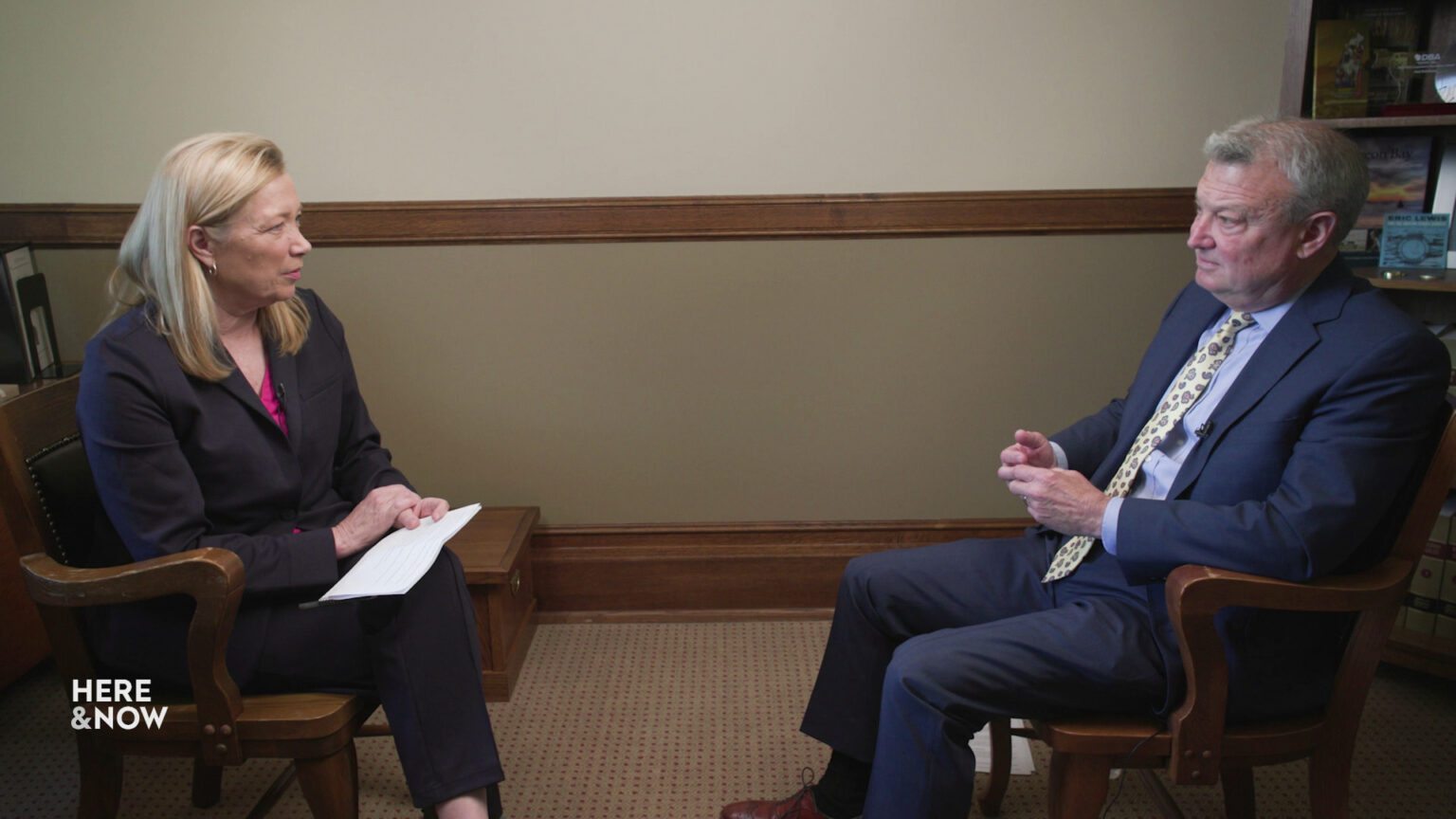'Here & Now' Highlights: Rep. Joel Kitchens, David Krause, Ryan Rasmussen
Here's what guests on the May 31, 2024 episode said about snags in a new law to promote K-12 reading proficiency, the Wisconsin pension fund investment in Bitcoin and what a new state rule for food pantry recipients means as need remains high.
By Frederica Freyberg | Here & Now
June 3, 2024

Frederica Freyberg and Rep. Joel Kitchens (Credit: PBS Wisconsin)
A new state law that requires teaching phonics to early readers is the courts, and state Rep. Joel Kitchens, R-Sturgeon Bay, expressed dismay that his signature piece of bipartisan legislation is wrapped up in a political fight. The state of Wisconsin now has Bitcoin in its pension fund portfolio — Marquette University finance emeritus professor David Krause called this alternative investment ahead of the curve. A new state rule for food pantries means visitors will no longer have to provide their address — Ryan Rasmussen, executive director of the Oshkosh Area Community Pantry, said this change will reduce barriers to access but could result in local shortages.
Rep. Joel Kitchens
R-Sturgeon Bay
- Starting in the fall of 2024, a new state law mandating how children must be taught to read goes into effect. The law requires teaching phonics – or the relationships between sounds and words – instead of using prompts like pictures to solve unknown words. Fewer than 40% of third-grade students in Wisconsin tested at a proficient level in reading during the 2022-23 school year, and Rep. Kitchens called this legislation the most important thing he’s worked on in office. The Republican Legislature is suing over a veto by Democratic Gov. Tony Evers of how $50 million dollars to help fund the change can be used.
- Kitchens: “It’s frustrating — you know, it’s sort of politics. What the governor did, actually, with the veto, was not that horrible. It’s just the precedent of him being able to go in and use a partial veto where traditionally he has not been able to use it. Our lawyers, when they drafted the bill, said he does not have that authority. So it would set a dangerous precedent. It’s sort of similar to the problems that we’re having with that bill, where the governor seems to think that he can change how the money is spent. And that’s just going to be a problem.”
David Krause
Professor emeritus of finance, Marquette University
- The Wisconsin Department of Employees Trust Fund – ranked as one of the most fiscally sound pension funds in the nation – took bold action in the first quarter of 2024: It invested in Bitcoin. Most government workers in the state are participants in the Wisconsin Retirement System that pays out benefits. Is this action a departure for a pension fund widely deemed as being stable, prudent and smart with investments – or is it right on brand? Krause said Wisconsin’s decision is turning heads among institutional investors and cryptocurrency proponents.
- Krause: “It’s a good investment in the sense that it’s going to add diversification. The objective of a portfolio manager fund is to maximize return while minimizing risk. Bitcoin, like other alternative investments, does not move in parallel with stocks and bonds. So therefore it adds a nice diversification effect. The potential upside returns are high as it could be with any new technology. And finally, because this is a currency with a limited supply, it actually can serve as an inflation hedge. I don’t think very many people talk about the potential for it to remove volatility of government actions.
Ryan Rasmussen
Executive Director, Oshkosh Area Community Pantry
- Starting in October 2024, emergency pantries in Wisconsin that accept donations from the federal Emergency Food Assistance Program can no longer ask visitors to verify their address in order to access free food. This new state rule comes as food pantries are seeing an explosion in need and such verification can be a barrier to access. It could result in shortages at high-demand locations like the Oshkosh Area Community Pantry, which saw a 70% increase in usage in 2023, because visitors could increasingly choose pantries outside their area. Rasmussen said the change will require some additional planning to keep people fed.
- Rasmussen: “I certainly agree that creating a barrier-free opportunity is super important, and we value that and we believe that also. But I think there’s some logistical concerns that we really need to think through in order to make this happen. Obviously ensuring that there’s plenty of food to go around all the pantries that need is one of them. And I think one of the things we’ll have to look at is how can we redistribute that food? In a food system where food is available, you can get it. But how can we allocate it the right way to the pantries that need it, that are seeing some major increases?”
Watch new episodes of Here & Now at 7:30 p.m. on Fridays.
Editor’s note: PBS Wisconsin employees are participants in the Wisconsin Retirement System.
 Passport
Passport











Follow Us